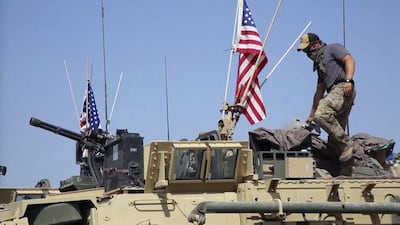BEIRUT // For US troops in Syria, the mission was meant to be simple: support Washington’s allies on the ground in the fight against ISIL, stay in the background and avoid getting entangled in the country’s complicated civil war.
But now, some US forces are stationed far from the battle, flying their flags on Syria’s northern border with Turkey in an attempt to once again create a buffer between America’s two biggest allies in the fight against ISIL – Ankara and the Kurdish YPG militia.
Washington’s deployment to the border in recent days follows Turkish air strikes against YPG positions in Syria on Tuesday last week, which killed 20 people and raised fears about future action by Ankara against America’s most valuable ally on the ground. Following these strikes, the YPG had called on the US-led anti-ISIL coalition to implement a no-fly zone over northeastern Syria. What they got instead were US troops acting as human shields.
These troops may well be needed. Turkish president Recep Tayyip Erdogan has threatened additional military action against YPG fighters and said on Tuesday he would not allow the militia to use Syria to press its case for Kurdish autonomy.
Turkey views the YPG as an extension of the outlawed Kurdistan Workers’ Party (PKK), which has fought for Kurdish autonomy against the Turkish state for three decades, and which Washington has also labelled a terrorist organisation. America’s relationship with the YPG has long irritated Ankara and US forces have acted as a buffer between the two foes before. But the stakes are even higher now, with Turkey promising additional action and Mr Erdogan saying he will raise the issue with Russian president Vladimir Putin in Moscow on Wednesday, and with president Donald Trump when he visits Washington in less than two weeks.
“We are seriously concerned to see US flags in a convoy that has YPG rags on it,” said Mr Erdogan in a speech on Sunday, according to the state-run Anadolu news agency. “If we do not work together against terrorism, then tomorrow it will strike another ally.”
Turkey had counted on Mr Trump’s promise to recalibrate US strategy against ISIL, hoping Washington would finally heed Ankara’s plea for less reliance on Kurdish forces in Syria. But in the months since his inauguration, Mr Trump’s policy has only expanded on Mr Obama’s, with the United States dramatically increasing its military presence in Kurdish areas of Syria and leaning ever more heavily on the Kurds in the battlefield.
On Monday, the YPG-dominated Syrian Democratic Forces said they were almost in control of the strategic town of Tabqa, 40 kilometres west of ISIL’s self-declared capital, Raqqa. The US airlifted SDF fighters behind enemy lines in March, allowing them to surprise and outflank ISIL forces.
Along other areas of the front line against ISIL, SDF fighters are just a few kilometres away from Raqqa and poised for an assault. But as long as Turkey is threatening additional attacks on the YPG, the SDF may be unwilling to begin its offensive.
Turkey initially intervened in Syria in August last year to back Arab rebel proxies in removing ISIL and YPG forces from its border. In March, Ankara announced the end of that operation. But within weeks Mr Erdogan was hinting about another military operation to confront Kurdish fighters in both Syria and Iraq. With recent air strikes hitting YPG forces in Syria and PKK forces in Iraq simultaneously, it appears that a new Turkish offensive may be starting.
These strikes could be one last attempt by Ankara to get the US to rethink its support for a SDF assault on Raqqa and instead join forces with Turkey in what will be the most important battle against the extremists in Syria.
“The huge America, the coalition and Turkey can join hands and turn Raqqa into a graveyard for Daesh,” said Mr Erdogan on Saturday.
So far, the US has continued to do what it has throughout the war against ISIL – namely encourage all of its allies to cooperate and not to fight one another. But both Turkey and the YPG have given no indication that they plan on listening.
jwood@thenational.ae
* With additional reporting by Agence France-Presse

